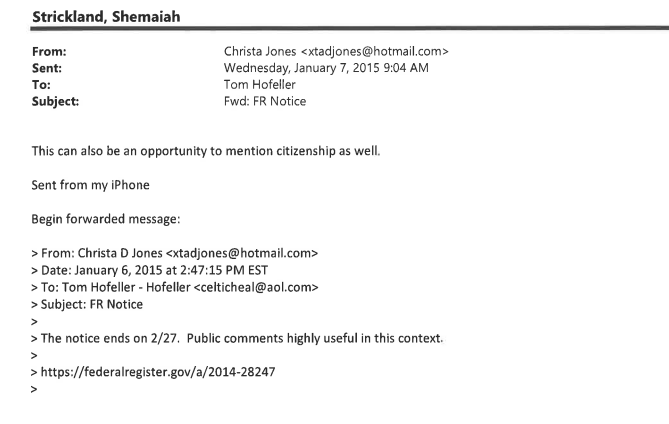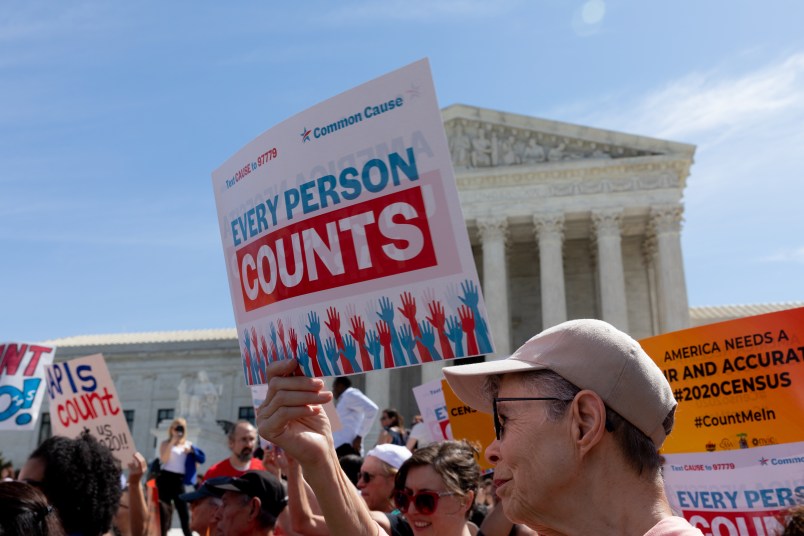Voting rights group say they have found even more evidence connecting a now-deceased GOP gerrymandering consultant to the Trump administration’s push to add a citizenship question census.
The evidence, put forward in a Friday night court filing, is a 2015 email exchange between the consultant, Thomas Hofeller, and a longtime Census Bureau official who went on to become the the chief of staff to the Bureau’s deputy director under the Trump administration.
In the emails, the Bureau official, Christa Jones, told Hofeller that the public comments were open on a census-related federal notice and suggested that it could “be an opportunity to mention citizenship as well.” The email came from Jones’ personal account.

The emails were sent eight months before Hofeller conducted a secret study for a GOP mega donor that concluded that adding a citizenship question to the census would be necessary for conservatives to overhaul redistricting in a way that would be “advantageous to Republicans and non-Hispanic whites.”
During the 2016 transition, Hofeller was the first to suggest to the Trump transition team that it seek to include on the census a citizenship question, a transition official testified in the litigation. Months later, he apparently ghostwrote a key paragraph in a draft justification for the question that was given to the Justice Department official who ultimately authored the formal request for the question.
The Commerce Department denies that Hofeller or his views played a role in Secretary Wilbur Ross’ decision to add the citizenship question.
Jones, the Bureau official who emailed Hofeller in 2015, was involved in the the Trump administration’s efforts to add the question, internal records produced in the litigation have shown. It was Jones who recommended that the Census Bureau reach out to far-right anti-immigrant activists who could speak favorably about adding the question.
She was also a go-to contact at the Bureau for the Commerce Department as it worked to get the question added, a Commerce official said in deposition, according to NPR.
The 2015 emails were put forward by the challengers in the case brought in Maryland, which is currently on appeal in the 4th U.S. Circuit. The challengers also put forward other emails, found among Hofeller’s files, that show Hofeller was emailing with Jones and GOP operatives about redistricting-related matter.
The challengers are asking the trial judge, U.S. District Court Judge George J. Hazel, to consider making a so-called indicative ruling that takes into account the new evidence.
The “newly discovered documents suggest that Hofeller had also long been in contact with a highly-ranked Census employee, who knew of Hofeller’s interest in a citizenship question (and in fact suggested opportunities for him to raise that interest with the Census Bureau), and of his involvement in Republican redistricting efforts,” the filing, from the Mexican American Legal Defense and Educational Fund and Asian Americans Advancing Justice, said.
While Hazel previously ruled that Trump’s addition of the citizenship question violated administrative law and the enumeration clause of the Constitution, he did not find that the question was racially discriminatory, as the challengers had also alleged.
“Defendants and their co-conspirators, based on discriminatory motives, engaged in conspiratorial conduct for the purpose of depriving Plaintiffs of their constitutionally guaranteed right to equal representation,” the Maryland challengers said in their Friday filing.
This effort is separate from the requests made by challengers in the New York census case. Those challengers, which include the ACLU, were the first to reveal the 2015 Hofeller study and the paragraph he ghostwrote for the draft. They’ve asked the trial judge in their case to sanction witnesses for obscuring the evidence, and they have also requested that the Supreme Court delay its ruling in the case so that the trial court can consider the new evidence.
The Department of Justice has denied any connection between Hofeller’s 2015 study and the formal request that DOJ official John Gore wrote that the question be added. On Saturday morning, it declined to comment on the latest filing.
The role Hofeller played in getting the question added and the motives he had in doing so undercuts the Trump administration’s claim that the question be added to enhance Voting Rights Act enforcement, the voting rights groups allege. Three courts have already ruled the VRA rationale was pretextual, given the plethora evidence that Commerce Secretary Wilbur Ross was demanding his staff get the question added, even before any voting rights purposes for it were discussed.
The newly discovered Hofeller evidence shows that a key proponent for the question knew that it could be used to diminish minorities’ voting rights, rather than enhance them. Under the proposal he studied in 2015, citizenship data would be used to exclude non-citizens from the count that state legislators rely on to draw legislative districts, shifting political representation away from more diverse, more immigrant-heavy regions, and towards whiter, more rural areas of the country.
The evidence also suggests that Hofeller was involved in coming up with the VRA rationale that the administration ultimately put forward.
A Commerce Department spokesperson said that the challengers’ “new unproven narrative” was “as ridiculous as their previous ones,” and that the challengers’ “conspiracy theories are outlandish and should be disregarded.”
“Neither Dr. Hofeller nor his views were part of the Secretary’s decision to reinstate the citizenship question on the 2020 Census,” the spokesperson said.
Hazel will hold a hearing on Tuesday on the challengers’ request.
Correction: This story has been corrected to reflect that Jones reports to the Census Bureau’s deputy director, not its director.
Read the filing below:










